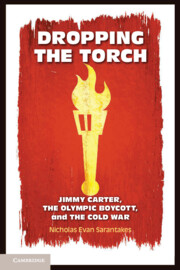Book contents
- Frontmatter
- Contents
- Acknowledgments
- Abbreviations
- Introduction Miracle on Ice
- Chapter 1 Lord Killanin and the Politics of the Olympics
- Chapter 2 Los Angeles versus Moscow
- Chapter 3 Jimmy Carter and U.S.-Soviet Relations
- Chapter 4 The Soviet Invasion of Afghanistan
- Chapter 5 The American Response
- Chapter 6 Easy Victories
- Chapter 7 Painful Losses
- Chapter 8 The White House Games
- Chapter 9 Coca-Cola, NBC, and the Defeat of the Iron Lady
- Chapter 10 The Vote in Colorado
- Chapter 11 Civil Wars
- Chapter 12 Carter versus Killanin
- Chapter 13 Moscow: The Olympics Are the Olympics
- Chapter 14 Los Angeles
- Chapter 15 Conclusion
- Epilogue
- Notes
- Bibliography
- Index
Chapter 3 - Jimmy Carter and U.S.-Soviet Relations
Published online by Cambridge University Press: 05 September 2012
- Frontmatter
- Contents
- Acknowledgments
- Abbreviations
- Introduction Miracle on Ice
- Chapter 1 Lord Killanin and the Politics of the Olympics
- Chapter 2 Los Angeles versus Moscow
- Chapter 3 Jimmy Carter and U.S.-Soviet Relations
- Chapter 4 The Soviet Invasion of Afghanistan
- Chapter 5 The American Response
- Chapter 6 Easy Victories
- Chapter 7 Painful Losses
- Chapter 8 The White House Games
- Chapter 9 Coca-Cola, NBC, and the Defeat of the Iron Lady
- Chapter 10 The Vote in Colorado
- Chapter 11 Civil Wars
- Chapter 12 Carter versus Killanin
- Chapter 13 Moscow: The Olympics Are the Olympics
- Chapter 14 Los Angeles
- Chapter 15 Conclusion
- Epilogue
- Notes
- Bibliography
- Index
Summary
It is an irony of fate that the Olympic boycott pitted two principled men against each other. Like Lord Killanin, Jimmy Carter had taken a strong, moral stand against the shortcomings of his society and in the end profited from his convictions. The two men came from backgrounds that, while not diametrically opposite, were still significantly different.
Carter grew up on a farm in Georgia. “My most persistent impression as a farm boy was of the earth,” he recalled many years later. “There was a closeness, almost an immersion, in the sand, loam, and red clay that seemed natural, and constant.” Neighbors in the countryside were few and far between, and Carter described his life as “isolated but not lonely.” Much like Killanin’s Ireland, Carter’s Georgia still harbored grievances about history and particularly toward the nation’s capital. In the case of Georgia, the festering wound was the defeat in the U.S. Civil War. “Although I was born more than half a century after the war was over, it was a living reality in my life,” Carter recalled. “I grew up in one of the families whose people could not forget that we had been conquered.”
- Type
- Chapter
- Information
- Dropping the TorchJimmy Carter, the Olympic Boycott, and the Cold War, pp. 46 - 59Publisher: Cambridge University PressPrint publication year: 2010

